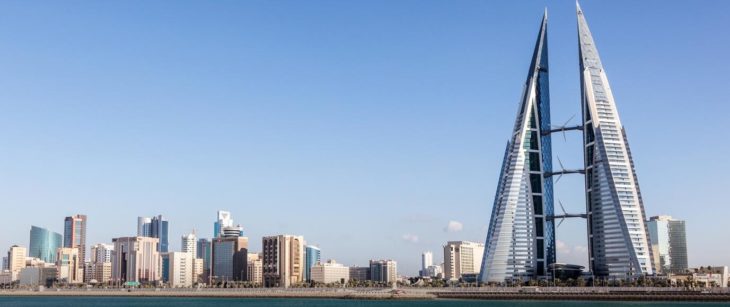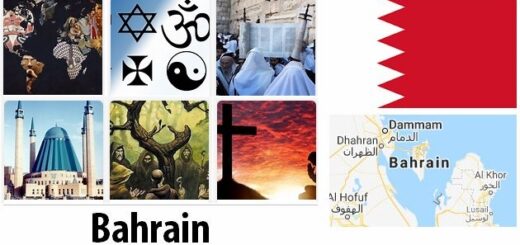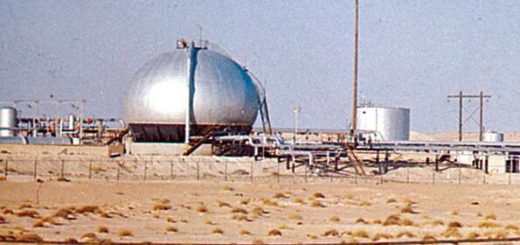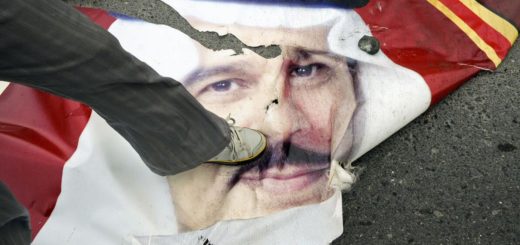History of Bahrain
Bahrain has a long history characterized by its location on the Gulf of Persia and as a trading center. Trade formed the basis for the development of a society that laid the foundation for modern state formation in 1971.
Bahrain has been inhabited from prehistoric times for more than 5,000 years. It is believed that the country in the Bronze Age was part of – and perhaps the center of – the Dilmun civilization. Dilmun is said to have covered the area along the east coast of the Arabian Peninsula, including today’s United Arab Emirates, Kuwait, Qatar and Oman, as well as parts of Saudi Arabia. This community established trade routes through southern Iraq to Pakistan and India, and also traded with other early civilizations such as in Mesopotamia and the Indus Valley. Dilmun as the center of business and commerce is not unlike that positionBahrain has gained in modern times. Civilization lasted for approx. two thousand years, from about 2500 years before our time calculation.
Oldest story
From the sixth century before our time, Bahrain became part of the Persian Empire during the Akamenids. Arab tribes immigrated from Hijaz and Yemen on the Arabian Peninsula from about 180 BC. Early in the fourth century, Bahrain was invaded by Shapur II of Persia, and the country became subject to the Persian province of Pars. Alexander the Great’s Admiral Nearkhos explored Bahrain, known by the Greeks as Tylos, in the 500s. The Roman author Pliny later referred to the country’s pearls in positive order; Early fishing was an important industry here as in other parts of the Gulf.
Several Persian dynasties, the Arsakids and the Sasanids, controlled the area of Islam’s emergence in the 600s. Bahrain then designated a larger geographical area than today’s Bahraini state. In the third and fourth centuries, Bahrain was influenced by Christianity, and Nestorian writings tell of established denominations before Islam entered.
Islamization
Bahrain was one of the first areas where Islam was accepted as a belief in 629. Prophet Muhammad sent his representative, al-Alaa al-Hadhrami, to Bahrain in 622, and succeeded in establishing control over the area, from there to try to take control of Pars. In the 680s, the Islamic direction of the Kharijites established itself in Bahrain and spread its influence from there. Bahrain became a recognized teaching site in the Islamic world, with several well-known scribes. In the first few centuries after the advent of Islam, both Islam and Christianity prevailed in the country, until the Islamic faith won over the majority; there is still a significant Christian minority in Bahrain.
In the 9th century, a Karmic republic, al-Qarmatia, was established by a radical Shiite sect originating in present-day Iraq and taking control of Bahrain’s then capital al-Hasa. From there, the Karmatians attacked pilgrims, and attacked in 930 Mecca, from where they took the sacred black stone from Kaba to Bahrain. In 1077–78, the Karmats were defeated by the Arab Dynasty of the Ujunids, supported by the Seleucids in Iraq. Bahrain was occupied by Pars in 1235, and then regained its independence under a new Arab dynasty, the Unfurid, until it was annexed by Hormuz. In the mid-1500s, the country was subjugated to the Arab Jabrid dynasty, which introduced the Sunni direction of Islam as the dominant one in Bahrain.
Bahrain’s recent history is also marked by foreign powers’ interest in the country’s strategically important location. Several countries, both from the region and from European states, subjugated Bahrain. The foundations of modern state formation were laid in the late 18th century, when the al-Khalifa family took control of the country, eventually seeking Britain’s protection. Bahrain then became a center for British rule in the Gulf, and was a British protectorate until independence in 1971. Compared to other countries in the Gulf region, modern Bahrain has a tradition of a developed civil society, with trade unions and political as well as religious groups, such as has participated in social development.
Foreign conquest
In 1487, Bahrain was conquered by Omanians. After the Portuguese seafarer Vasco da Gama sailed in the Gulf in 1497, Portugal in the following years established trading interests in the area, including Bahrain – which was ruled by Portugal in the period 1521-1602, and in 1556 fought back an Ottoman attack. Portuguese control ended in 1602, when Bahrain was captured by Persian forces under Shah Abbas I. In 1717, the Sultan of Oman took control of Bahrain for a brief period after invading the country, before the new Shah of Persia., Nadir, with British and Dutch support, withdrew it in 1736. The new Persian rule was short-lived: In 1783, the Persians were driven out by the Arab Khalifa family and its supporters, and the first of the dynasty rulers in Bahrain came to power, Ahmed ibn Muhammad ibn Khalifa (also known as Ahmed al-Fateh).
The history of Bahrain as a modern state starts with the al-Khalifa family’s takeover of power in 1783. In previous years, the family had moved to Kuwait to Qatar, and from there to Bahrain, where it settled in 1797. Occupation of Bahrain occurred with support from the Sabah family in Kuwait, and an Omani attack in 1801 was fought back with the help of the Saud family in Najd (present-day Saudi Arabia); these three dynasties are still in power in their respective countries. After a brief intermission in 1810–11, when Bahrain came under Wahhabi rule, together with Qatib (in present-day Yemen) and Qatar, the Khalifa family regained power.
British protection
Several great powers sought to assert their influence over Bahrain; The golf area was also haunted by extensive piracy. British forces intervened several times throughout the 19th century to protect the Bahraini dynasty, and a first agreement regulating this relationship was made in 1820. Bahrain’s protection was particularly needed for Persia. The Persians (Iran) have claimed to Bahrain until modern times, and there is still a significant minority of Persian origin in the country. In 1830, Bahrain agreed to demands from Egypt’s ruler Muhammad Ali Pasha on an annual tax. Bahrain’s rulers also felt threatened by pressure from Wahhabites in later Saudi Arabia, who in 1854 attacked the country, where the sheikh called for British assistance, and sought protection from both Egypt and Egypt.Iran.
An invasion attempt, backed by Qatar, from rival Arab family ibn Ali, seeking to seize power from the Khalifa family, was defeated by British forces. This was done under the new agreement between Bahrain and the United Kingdom from 1861. This, which was formally a maritime peace treaty, made Bahrain a British protectorate. Bahrain pledged to refrain from warfare, piracy and slavery against the UK assuming responsibility for its security as well as its relations with other countries. In a supplementary agreement from 1868, Bahrain undertook not to relinquish parts of its territory other than to the United Kingdom. The agreement of 1861 was revised in 1892 and 1851. Through such agreements with the Sheikhs of the Gulf, the United Kingdom secured control over most of the area, which was of great importance to the country’s sea connection with India.
From the end of the 19th century, British administration of Bahrain was taken care of by the colonial administration in India, to be transferred to London by India’s independence in 1947. From 1902 a British envoy in Manama exerted a direct influence on the Bahraini ruler, and Britain had a closer monitoring of Bahrain than of the other Gulf states with protection status. The scheme was formalized through the establishment of a Governing Council in 1919, whereby the British envoy ruled together with representatives of the Sheikh. The first local elections were held that year. An agreement between the British and Ottoman governments in 1913 recognized Bahrain’s independence, but the country remained under British administration, with anchoring in agreements made with the Bahraini ruler. The British power was shown in 1923, when Sheikh Isa ibn Ali al-Khalifa was forced to abdicate; The limited influence of the British was also shown by the fact that the change of power was not accepted by the people, who regarded the new ruler, Sheikh Hamad, only as representing his deposed father.
In 1938, the United Kingdom made Bahrain its premier naval base in the Gulf, until 1958. From 1946, the top British representative in the Gulf area moved to Bahrain from Iran, further emphasizing the importance Bahrain was given.
The modernization of the Bahraini society in the 20th century was linked to the extraction of oil, which started in 1932, and which provided revenue to the country which enabled broader business development. Early in the century commerce still dominated, including pearls. Already, while Bahrain was a British protectorate, demonstrations were directed at the authorities several times. In the 1910s and 1920s, the trading industry objected to economic regulations introduced by the British. Later, intellectuals and others joined opposition to British rule, with increased unrest in the 1950s, not least with the participation of left-wing groups, including the National Union Committee (NUC), affiliated with trade unions; established in 1954 – and banned two years later. Arab nationalism also prevailed in the Bahrain in the 1950s, with demands for independence. These had their roots in all social and religious sections of society. The unrest, with demonstrations and strikes, continued in the 1960s, driven by the radical groups National Liberation Front (NLF) and Popular Front for the Liberation of Bahrain (PFLB). A demonstration in 1965 specifically targeted British rule.
Bahrain participated in World War II on the Allied side, and in October 1940, oil installations in the country were bombed by Italian aircraft, without doing much damage. In 1968, the United Kingdom decided to withdraw from the Gulf, including Bahrain. Two years earlier, the British had moved their main naval base in the region from Aden (Yemen) to Bahrain, as part of the settlement there.
Empowerment
In 1971, Sheikh Isa bin Sulman announced al-Khalifa Bahrain’s independence, with himself as head of state (emir). Sheikh Isa took over as ruler of Bahrain in 1961, after his father Salman bin Hamad al-Khalifa. Prior to independence, when the new title emir was adopted, the Bahraini rulers bore the title hakim (from 2002 the title is used king). Bahrain chose full independence after first merging with other states in the region in 1968 in a union, the Federation of Arab Emirates, which later became the new United Arab Emirates. As a result of independence in August 1971, Bahrain left the Union.
Prior to independence, the previous administration council was transformed into a government council in 1970, which by then became the country’s government. Elections to a constitutional assembly were held in 1972, and this drafted the new constitution, which came into force in 1973. Elections to a national assembly with advisory function were held in December of that year. The Constitution banned political parties and trade unions. The representatives were formally independent, but belonged to two blocs, and when these failed to find solutions to several key issues, the Prime Minister, Sheikh Khalifah bin Salman al-Khalifa, dissolved the government. Then the emir dissolved the National Assembly and took over the government, and then reinstated the government, which was given legislative authority. That same year there was new unrest, with demonstrations aimed at the government, and the opposition strengthened,
The opposition came from several sides, both social and religious – and both from the Shia and Sunni people. Several opposition groups were formed, including the Social Reform Society, dominated by Sunnis, and the Islamic Action Organization (IAO), supported essentially by Shia. The latter, and other Shia-dominated groups, held demonstrations in the spring of 1980 in support of the new regime in Iran after the revolution there. The demonstrations were beaten by Bahraini security forces and several were killed. After this, several underground groups emerged that initiated sabotage actions. One of these was the Islamic Front for the Liberation of Bahrain (IFLB), headquartered in Tehran. The group was accused in 1981 of planning a coup against the emir, and of wanting to establish an Islamic republicin Bahrain. The Islamist groups were mainly fought, and restrictions were imposed on Shiites, who were not allowed to enter the armed forces, among other things.
By independence, the Anglo-Bahrain Protection Agreement was replaced by a friendship agreement. In the same year, 1971, Bahrain entered into an agreement with the United States that allowed Americans to rent military facilities in the country; in practice they took over the former British naval facilities. Relations with Saudi Arabia were strengthened in 1985 when a bridge link between the two countries was opened. When the Gulf Council was set up in 1981, Bahrain was one of the founders. Bahrain’s strategically important location was further emphasized during the Gulf War in 1990–91, when Iraq occupied Kuwait, and a multinational force led by Saudi Arabia and the United States was deployed to release Kuwait. Bahrain joined the coalition as part of a Gulf Council force, while using US military bases. Later in 1991, Bahrain and the United States signed a defense agreement.



